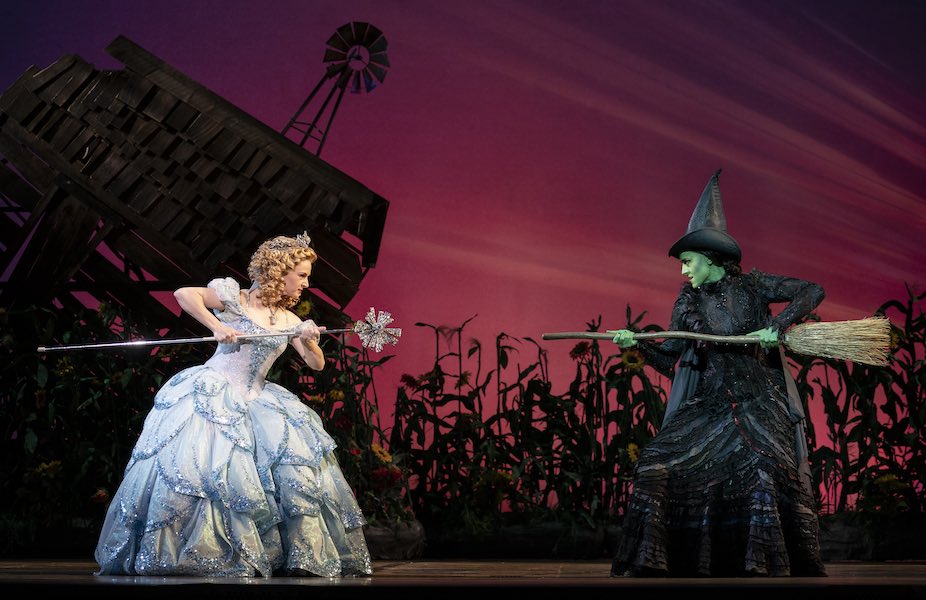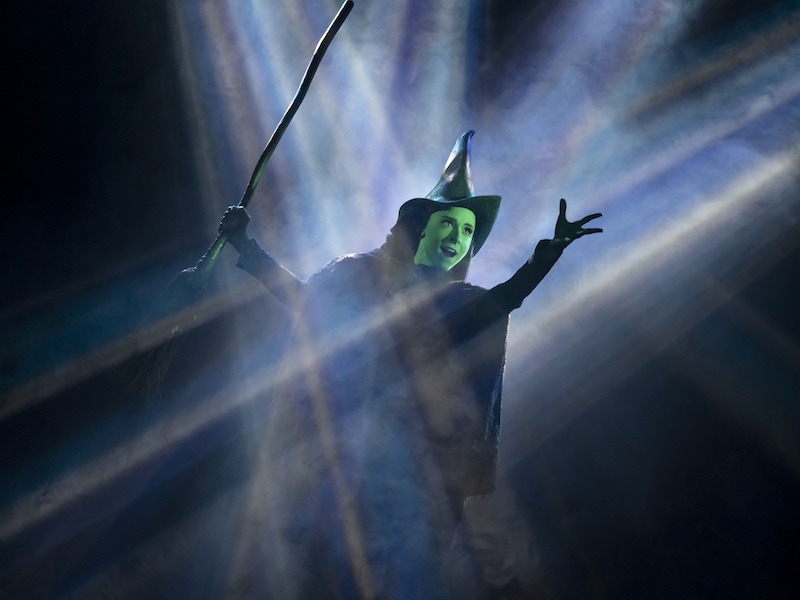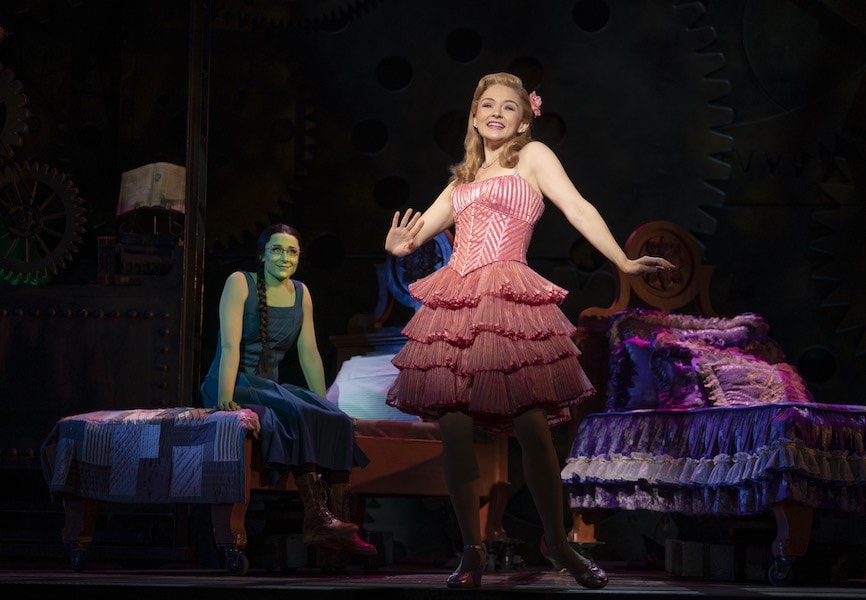Hard as it may be to believe, there are die-hard Broadway musical fans who have not yet seen Wicked since it first started defying gravity almost 20 years ago. I saw it on Broadway soon after it opened, in London, and at the Kennedy Center during its first national tour. I wanted to see how it has held up — whether it still has the magic. But to get a fresh perspective, I took with me a friend who, though a true theater connoisseur, had not yet seen it.
Wicked, “the untold story of the Witches of Oz” — with music and lyrics by Stephen Schwartz (who also penned Pippin and Godspell), book by Winnie Holtzman, and based on a novel by Gregory Maguire — arose in the era of spectacular blockbuster musicals. Under Joe Mantello’s original direction, it still sparkles. Even if one has heard the cast album a thousand times, it is still thrilling to hear the pounding overture played by a live orchestra, to see the staging that goes with it, and to experience the scenes between the songs that tell the story.
The first thing one sees on entering the theater is the giant mechanical time dragon over the proscenium, which is also adorned with gears, bolts, and cogs, steampunk style. Eugene Lee’s Tony-winning set carries on this association, situating the Land of Oz in L. Frank Baum’s original time period, ca. 1900, and setting up the tension between the mechanical trickery of the Wizard and the genuine magic of the green witch Elphaba (named by Maguire after Baum’s initials: L.F.B.). There are clever hints back to both the original books — the people in the Emerald City wear green spectacles, some of the illustrations even come to life onstage — and there are references to Dorothy, the Lion, the Tin Man, and the Scarecrow, but used in clever new ways.

Susan Hilferty’s Tony-winning costumes are just as fresh and original as ever. All of them are slightly off-kilter, with angled hems and diagonal openings, mismatched sleeves and pants legs, and clever cattywampus use of patterns. And the sight of male-presenting dancers wearing flowing skirts, daring in its day, is still refreshing. Wayne Cilento’s choreography and musical staging continue this exciting, eccentric feeling; it’s clear that we’re not in Kansas anymore.
So, the story, music, and staging hold up. But the big question is, how are the principals? Anyone stepping into the chief roles in Wicked will have enormous silver shoes to fill. In this production, they rise to the challenge, for the most part.
Natalie Venetia Belcon (who interestingly was the original Gary Coleman in Avenue Q, which beat out Wicked for the 2004 Best Musical Tony) makes a suitably sly Madame Morrible. John Bolton cavorts quite delightfully as the Wizard, his cheerful good humor showing one can think oneself good and still be wicked. Jordan Litz as Fiyero is beautiful and sings well, which is all that Fiyero really needs to do.
And as for the dynamic duo, Elphaba and Glinda, the opposites that become friends and end on different sides….
Lissa deGuzman has played Elphaba on the national tour for nine months. The night we saw her, she was unfortunately slightly underwhelming in the first act; her vocal levels were below Glinda’s. DeGuzman certainly rose to the challenge of “Defying Gravity,” though, as one would hope, and delivered a solid and gripping second act.

It does seem, however, that there is something a little too, well, little about her Elphaba. She is shorter than Glinda, almost delicate, and rather than projecting a gravitas to counter Glinda’s flightiness, she comes across as more waspish than passionate. She makes fun of Glinda’s squeaky voice very effectively at one point, but at other times, their vocal quality seems almost too similar. Elphaba and Glinda must be opposites in every way for their unusual friendship to be most moving.
The night we saw the show, Jackie Raye played Glinda, going on for star Jennafer Newberry, and picked up the sparkly wand with aplomb. As is often the case with understudies getting their chance to shine, Raye’s energy was terrific. She gave us a gymnastic Glinda, full of high kicks and back bends and pratfalls, and was a joy to watch. (A few times she punctuated her movements with some grunts and growls — amusing and different, but not very Glindaesque.) Her voice was fine, especially on Glinda’s operatic trills, and she was very touching in her conflicted Act 2 opener, “Thank Goodness,” when she discovers that having all one’s dreams come true is more complicated than she thought. All best wishes to Newberry, but those going to see the production need not worry if they see that dreaded little slip of paper in the program. Nobody gets cast in Wicked if they’re not top-notch.
As I sat watching with my friend, I realized all over again the best thing about Wicked. Even more than its spectacular staging, even more than the themes of good and evil and the parables about politics and propaganda that give it depth, what’s best is the moving story it tells of female friendship. The score embodies this, with two divas belting to the balcony and joining in glorious duets. The women are the stars of this story, meaning it has a wealth of wonderful music for female voices. It is a show that girlfriends, sisters, mothers, and daughters (and others who appreciate them) can go see to glory in girl power and what women can achieve together.

Overall, my friend’s and my reactions were very similar — Wicked is (still) “thrillifying.” It stands the test of time. If you haven’t seen it, for Oz’s sake, GO! And even if you have, it’s worth another trip to the Emerald City.
Running Time: Approximately two hours and 50 minutes, with one intermission.
Wicked plays through January 22, 2023, in the Opera House at the John F. Kennedy Center for the Performing Arts, 2700 F Street NW, Washington, DC. Tickets ($59–$349) are available at the box office, online, or by calling (202) 467-4600 or (800) 444-1324.
A limited number of $59 Rush tickets will be available for every performance (except between December 26 and 31) at the Kennedy Center Box Office beginning at noon for matinee performances and 5:00 pm for evening performances. Tickets are subject to availability and have no guaranteed location. Two tickets max per person. Available to purchase in person only. Void if resold.
The Wicked program is online here.
COVID Safety: Masks are optional in all Kennedy Center spaces for visitors and staff. If you prefer to wear a mask, you are welcome to do so. Kennedy Center’s COVID Safety Plan is here.






Completely agree about Lissa deGuzman. I originally saw Wicked in March 2010 in Richmond, VA, and it was fantastic! The person who played Elphaba there could have given Idina Menzel a run for her money. I saw it at the Kennedy Center yesterday and was not impressed. Lissa and Jennafer had zero chemistry. Jennafer needs to articulate better; many of her lyrics were unclear. Lissa’s voice and acting aren’t great. She seems to be trying to imitate Idina, and she didn’t do it well. The rest of the cast was excellent, but I’m disappointed in the quality of the main players.